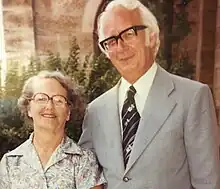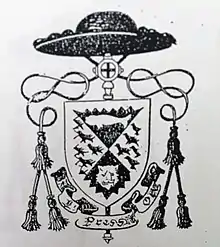Stuart Babbage | |
|---|---|
 Babbage and his wife, Elizabeth, in Sydney (1973) | |
| Born | Stuart Barton Babbage 4 January 1916 |
| Died | 16 November 2012 (aged 96) Sydney |
| Resting place | St Jude's Church, Randwick, Sydney |
| Citizenship | Australian |
| Alma mater |
|
| Occupations |
|
| Spouse |
Elizabeth Babbage
(m. 1943; died 1984) |
| Children | 4 (Veronica, Malcolm, Christopher, Timothy)[1] |
| Parents |
|
| Relatives | Charles Babbage |
| Known for |
|
| Ecclesiastical career | |
| Religion | Christianity |
| Church | Anglican |
| Ordained | December 1939 |
Stuart Barton Babbage AM (4 January 1916 – 16 November 2012) was an Anglican priest.[2]
Babbage was educated at Auckland Grammar School, the University of Auckland and King's College London.[1] He was ordained in 1940.[3] His first post was as a curate at Havering-atte-Bower. Then he was a chaplain in the RAF[4] from 1942 to 1946, having been ordained 17 December 1939,[5] in Essex. Returning to Australia he became Dean of Sydney, serving from 1947[6] to 1953; and then Melbourne from 1953 until 1962.
Babbage also served in theological education for which he was awarded the Order of Australia as a part of the 1995 Queen's Birthday honours list.[7] He lectured at Moore Theological College while he was Dean of Sydney, and served as principal of Ridley College (Melbourne) while he was Dean of Melbourne. He moved to the United States to become one of the founders of Gordon–Conwell Theological Seminary before returning once more to Australia to become master of New College at the University of New South Wales.[8] At the same time he served as Registrar of the Australian College of Theology, from 1973-1991. [9] Babbage received a Doctorate of Theology from King's College, London, England.
Family

Stuart Babbage was born in Auckland, New Zealand, the eldest of six, to Gordon Swaine and Florence (née' Rutherfurd) on 4 January 1916. His family tree has been traced back to Charles Babbage (1791–1871), an English Polymath credited with inventing the first computer. Babbage's grandfather, Charles Whitmore Babbage, took the family to New Zealand where Gordon Babbage was born.[1] His uncle, Eden Herschel Babbage (1844–1924) was considered the "father of Roseville," of which Babbage Road in Roseville is named, and served as manager of the Bank of Australasia.
After a troubled youth, Babbage went on to earn a master's degree by the age of 20 before traveling to London, England to pursue his PhD in theology. His thesis was on the Puritan movement and he was ordained in December 1939 in the Anglican priesthood. While serving as a chaplain in Feltwell, Norfolk with the RAF, Babbage met and married RAF flight officer Rachel Elizabeth King in 1943. Together Stuart and Elizabeth had four children, Veronica, Malcolm, Christopher, and Timothy. The family, minus Veronica, traveled to Atlanta, Georgia, in 1963 leaving Melbourne, Australia to participate in the American Civil Rights Movement, befriending Reverend Martin Luther King Jr. Babbage became a professor at Columbia Theological Seminary in Georgia at the invitation of J. McDowell Richards, then president of the college from 1932 to 1971.[10] He served as vicar in an African-American church in Atlanta. Babbage's son, Christopher married an African-American LaNell Johnson and integrated the Episcopal Cathedral in Atlanta. Lisa Noel Babbage, granddaughter to Babbage, chronicled the interracial marriage of her parents in the biography 333 Miracles'.
Career
Babbage considered himself an Anglican evangelist, welcoming the Reverend Billy Graham to Australia for the 1959 crusade[11] as executive chairman of the Melbourne Billy Graham Crusade. After arriving in the US, Babbage worked with Martin Luther King in Georgia. Babbage along with other clergy integrated "white only" churches and public parks in the 1960s. It was always at the heart of Babbage to create a safe place for young people to learn and achieve. He started after school clubs for young black children in low income neighborhoods while teaching at Columbia School of Theology in Decatur, Georgia. Eventually, Babbage moved to Pennsylvania and Massachusetts to help found the multi-racial Gordon-Conwell Theological Seminary.[12] He wrote seven books, including a biography Memoirs of a Loose Canon.
Babbage lectured throughout New South Wales on controversial topics at the time, including divorce, stating "It is the simplest thing in the world to take out an order for restitution of conjugal rights, and, on this being ignored, to secure a divorce on the grounds of desertion. This encourages divorce by collusion",[13] citing instead with biblical prescriptions for life-long fidelity.
Babbage died in Sydney, New South Wales,[1] on 16 November 2012, survived by eight grandchildren, 15 great-grandchildren and two great-great-grandchildren.[14]
References
- 1 2 3 4 "Humanitarian too direct for some". The Sydney Morning Herald. 8 January 2013.
- ↑ "A Tribute to Rev Dr Canon Stuart Barton Babbage AM". 20 November 2012. Retrieved 2 July 2018.
- ↑ Crockford's Clerical Directory 1975–76 London: Oxford University Press, 1976 ISBN 0-19-200008-X p43
- ↑ "Stuart Barton Babbage Memorial Service – Ridley College". Ridley College, Melbourne. 8 February 2013. Retrieved 2 July 2018.
- ↑ Cairney, Trevor (19 November 2012). "A Tribute to Rev Dr Stuart Barton Babbage AM". Just in CASE. Retrieved 2 July 2018.
- ↑ "DEAN OF SYDNEY INSTALLED". Sydney Morning Herald. 14 March 1947.
- ↑ "Award Extract – Australia Honours Search Facility". Department of the Prime Minister and Cabinet (Australia). Retrieved 2 July 2018.
- ↑ "Dean's Newsletter, February 2013" (PDF). Australian College of Theology. Archived from the original (PDF) on 26 February 2015. Retrieved 10 December 2014.
- ↑ http://andjustincase.blogspot.com/2012/11/a-tribute-to-rev-dr-stuart-barton.html
- ↑ "About Us | Columbia Theological Seminary | Atlanta, Georgia". Columbia Theological Seminary. Retrieved 2 July 2018.
- ↑ "Billy Graham 1918–2013". Radio National. 22 June 2013. Retrieved 2 July 2018.
- ↑ "Feature: Canon Stuart Barton Babbage :: Sunday Nights". www.abc.net.au. Retrieved 2 July 2018.
- ↑ "The Sydney Morning Herald (NSW : 1842 – 1954)". Trove. Retrieved 2 July 2018.
- ↑ Melbourne Anglican